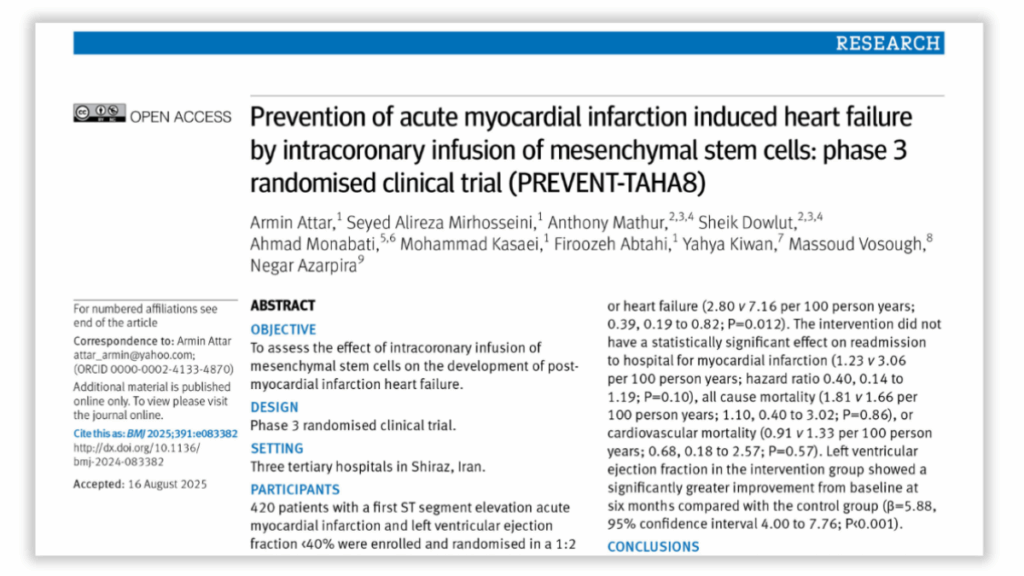
A week after The BMJ published a highly publicized paper claiming stem cell therapy can reduce the risk of heart failure, sleuths have unearthed what they are calling “serious” inconsistencies in the data.
The paper claims the phase III clinical trial published October 29 included over 400 patients in Shiraz, Iran, and tested whether stem cell therapy lowers the risk of heart failure after a heart attack.
The results were celebrated in a press release by the journal and appeared in several news outlets, with New Scientist calling the study the “strongest evidence yet that stem cells can help the heart repair itself.”
Almost immediately after the paper was published, sleuth Dorothy Bishop started noting inconsistencies with the data on PubPeer. Specifically, as she wrote in one comment, the study claimed to have enrolled only patients under 65 years old. However, in the accompanying data, 127 of the patients were older than 65 — a “complete mismatch,” she told Retraction Watch.
Bishop, who is also a professor of developmental neuropsychology at Oxford University, told Retraction Watch the age discrepancies alone should constitute a retraction, but after her observation, other sleuths started finding yet more issues with the data.
Nick Brown, a psychologist and sleuth, discovered a “curious repeating pattern of records in the dataset,” where every 101 records, almost all the values were identical, he wrote on PubPeer. Bishop speculated it was “as if somebody’s just cutting and pasting to full up a column.”
Almost all the patient’s weights — 288 of 334 reported cases — were integers, and multiples of five kilograms were “heavily over-represented,” Brown wrote in another PubPeer comment.
Some of the data issues may have been flagged during peer review, but the sequence of events outlined in the reports suggest the authors didn’t share the data until after review, Bishop said.
In the first decision, shared with the authors on January 30, clinical editor Juan Franco said the journal had “serious concerns regarding the reporting and data sharing.” The authors said they uploaded the data, but one of the reviewers noted it was uploaded as a private file for editors only. Only after its final peer review did the authors upload the data in accordance with The BMJ’s policy.
Bishop also noted a potential undisclosed conflict of interest for author Anthony Mathur, a researcher at Queen Mary University of London. Mathur is a shareholder and trustee of the Heart Cells Foundation, a charity that funds a unit for administering stem cell therapies to cardiac patients.
Brown, Bishop and others flagged several other issues with the paper, including a “discrepancy” between the number of subjects enrolled (420) and those disclosed during the trial registration (360).
Mathur acknowledged our request for comment but redirected us to the corresponding author, Armin Attar, a professor at Shiraz University of Medical Sciences.
Attar has responded to critics on PubPeer by stating: “During an internal audit, we have noticed some inconsistencies in the baseline demographic data.” He also wrote the authors were conducting a review “expected to take approximately two to three weeks.” Attar did not respond to our request for comment via email.
As for whether the data were intentionally manipulated, Brown told us he believed it was “impossible that these discrepancies could have occurred by chance.” He also said the article “needs to be retracted urgently.”
Emma Dickinson, head of media relations at The BMJ, responded to our request for comment: “We have noted the concerns. The BMJ takes allegations of data discrepancies seriously.”
Two of the 10 authors had affiliations with Queen Mary University of London. Seven of the remaining researchers are based in Shiraz University of Medical Sciences.
Five of Attar’s other papers have been flagged on PubPeer for image duplication and data issues, including some comments in the past week following the publication of this latest paper. None of the authors have had a paper retracted, according to our database.
Negar Azarpira, the last author on the article and a professor at Shiraz University, has 36 papers flagged on PubPeer for image and data concerns, all but four of which were flagged before The BMJ paper was published.
The cardiac stem cell field has faced controversy in the past. In 2018, Harvard and the Brigham and Women’s Hospital requested the retraction of more than 30 papers from the lab of Piero Anversa for falsified data. Many of those papers were later retracted. The National Institutes of Health continues to fund work in the field.
Like Retraction Watch? You can make a tax-deductible contribution to support our work, follow us on X or Bluesky, like us on Facebook, follow us on LinkedIn, add us to your RSS reader, or subscribe to our daily digest. If you find a retraction that’s not in our database, you can let us know here. For comments or feedback, email us at [email protected].
That was a great thread – I learned some new techniques. Some really great data visualisation
It’s amazing to me that the editors of the BMJ don’t take their jobs more seriously. This looks almost as bad as the Lancet publishing Wakefield.
When I was a medical student the BMJ was called the Women’s Own of medicine, partly due to both being printed on tissue-thin paper. The BMJ did have other uses.
I would also add that The New Scientist magazine reported on this problematic paper multiple times over the past few weeks and do not seem to consider the PubPeer comments even when users directly post to the Bluesky account and the reporter’s account.
Several days ago I wrote directly to the author of the/a New Scientist article, pointing out the PubPeer thread and suggesting that she might like to get out ahead of the pack on this, but so far I have had no reply. ¯\_(ツ)_/¯